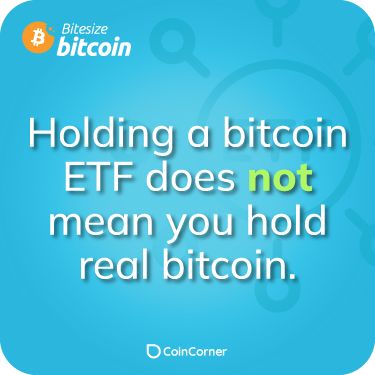Should I buy a Bitcoin ETF?

What is a Bitcoin ETF?
A Bitcoin ETF, or Exchange-Traded Fund, is a type of investment fund and exchange-traded product that is designed to track the price of Bitcoin. It provides a way for investors to gain exposure to Bitcoin without actually owning the cryptocurrency itself. Instead, the ETF owns the Bitcoin, and investors buy shares of the ETF.
How Does a Bitcoin ETF Work?
A Bitcoin ETF works much like other ETFs. An ETF issuer, typically an asset management company, purchases Bitcoin and securely stores it. Then, it issues shares of the fund to investors. The value of the ETF shares reflects the performance of Bitcoin. As the price of Bitcoin moves, the value of the ETF shares adjusts accordingly.
Why Invest in a Bitcoin ETF?
There are pro's and con's to Bitcoin ETFs that investors should always weigh up and make their own decisions accordingly.
Pros:
-
Convenience and Accessibility: ETFs are traded on traditional stock exchanges, making them easily accessible to a wide range of investors through their existing brokerage accounts. This accessibility lowers the barrier to entry for investors who may not be familiar with Bitcoin exchanges or wallets.
-
Regulated Investment: Bitcoin ETFs are regulated financial products, subject to oversight by regulatory bodies such as the Securities and Exchange Commission (SEC) in the United States. This regulatory oversight provides investors with a level of security and confidence in the investment vehicle.
-
Liquidity: ETFs typically offer high liquidity, allowing investors to buy and sell shares throughout the trading day at market prices. This liquidity can be beneficial for investors looking to execute trades quickly and efficiently.
Cons:
-
Counterparty Risk: Bitcoin ETFs are typically structured as derivative products, meaning investors do not directly own the underlying Bitcoin. Instead, they own shares in the ETF, which exposes them to counterparty risk associated with the issuer of the ETF. If the issuer fails or faces financial difficulties, investors may incur losses.
-
Premiums and Discounts: The price of Bitcoin ETF shares may not always closely track the underlying price of Bitcoin. In some cases, ETF shares may trade at a premium or discount to the net asset value (NAV) of the underlying Bitcoin holdings. This can introduce additional complexities and potential inefficiencies for investors.
-
Management Fees: Like other ETFs, Bitcoin ETFs typically charge management fees and other expenses, which can erode returns over time, especially in the long term.
-
Market Risk: Despite being regulated financial products, Bitcoin ETFs are still subject to market risks associated with the price volatility of Bitcoin and the broader cryptocurrency market. Investors should be aware that the value of their investment can fluctuate significantly in a short period.
-
Limited Control: Investing in a Bitcoin ETF means relinquishing control of the private keys associated with owning Bitcoin directly. Some investors may prefer to hold and manage their own Bitcoin for security and autonomy reasons.
Share this fact:





